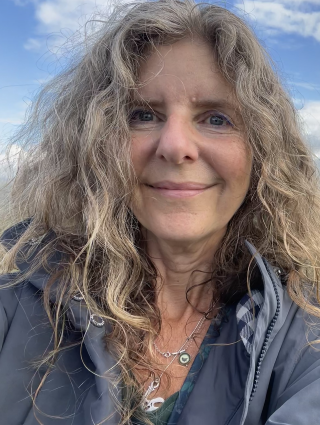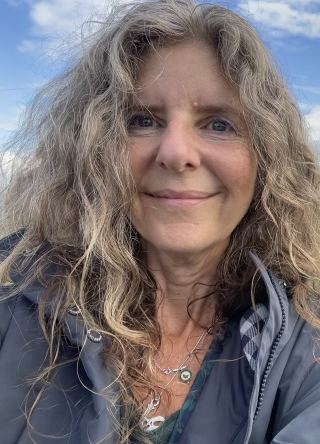Helping You Thrive
We are all living through difficult times, and at some point, we may feel overwhelmed or stressed by the news, by world events, by challenges in our personal lives, and we are left struggling to cope. It is understandable that we might seek support, and it takes courage to admit that you need help. Reaching out to a trained professional is the first brave step you are taking towards healing and growth.
Counselling can help us make sense of those challenging times and offers a way through them, moving towards a better understanding and acceptance of ourselves and our feelings so that we can move more easily through life.
Hi, my name is Jo and I am an integratively trained counsellor. I work with individual adults and young people (16+) to help them make sense of their struggles.

My main approach to therapy is primarily person centred; it is based on a therapeutic working relationship, and at its core is a compassionate, non judgemental view of the client. Within this safe working alliance, the right conditions are created to facilitate positive change. I can also draw on other valuable techniques and skills that enrich and support the counselling experience.
Please get in contact to see how integrative counselling or art therapy can help you.
How I Work
Integrative Counselling
‘Integrative counselling draws on techniques from different types of therapy to tailor an approach specifically for you.’ (BACP) . Put simply, this just means that I adapt any approaches I use in counselling to your individual needs and goals.
Person Centred Art Therapy
Sometimes it’s really hard to find the right words to express how we feel. It can be too painful or challenging. The Person Centred Art Therapy approach invites clients to make an image, focussing on the process and not the outcome. These spontaneously made images are then explored together, and the meaning of the image is revealed, through skilful facilitation. This can be a much gentler, safer way to express difficult emotions.We can use paint, crayons, collage, clay, or mixed media to make the image/object. It is a very containing way of working, and unlike words, the image remains there for us to return to, should we need.
“To such creations we need to offer much delicate respect, we, the midwives, helping the image from darkness to light, from the unconscious to the conscious.”
Liesl Silverstone (pioneer of the Person Centred Art Therapy technique)
This type of art therapy enables us to work at an intuitive level, trusting that the client has the inner resources and knowledge to enable the image to ‘speak ‘to the client, revealing, safely, and yet powerfully, what they need to know and integrate.
CBT
‘Cognitive Behavioural Therapy or CBT, is a family of talking therapies, all based on the idea that thoughts, feelings, what we do, and how our bodies feel, are all connected. If we change one of these, we can alter all the others.’ (BABCP)
It is said that we have over 6000 thoughts a day, many of them so fleeting that we don't even notice them, and many of them negative. CBT helps us become aware of our negative, automatic thoughts, attitudes and beliefs so that we can change them. This in turn, can change how we feel about ourselves and our lives.
Climate Informed
With the news full of climate related issues, climate anxiety has become a very real problem affecting many people. Climate anxiety is a sense of fear and worry associated with climate change. It can leave you feeling constantly on edge, struggling to concentrate and sleep, and making day to day living difficult. You may feel a sense of hopelessness, that there is nothing you can do to affect change and help control your feelings of anxiety.
I can support you in managing the fears that you may have, and help you make sense of them. Alongside regular talk therapy, we can utilise art therapy, breath work and mindfulness to help you gain control of your emotions and manage your anxiety, and reach a more peaceful and accepting place.
Eco Walk and Talk
I also offer Eco Walk and Talk Counselling. Getting out in nature is a great way to engage in counselling. We can enjoy all the benefits that walking in nature has to offer, and at the same time explore the challenges you are facing. Walking can help us focus on our discussion, giving us natural stimuli to enable you to express your emotions.
I often invite clients to use nature as a metaphor, such as exploring your internal weather, to help you find ways to explore your feelings and the difficulties you are facing more easily. Additionally, walking side by side can take the intensity out of counselling.
If you are feeling particularly self conscious or nervous about sharing and exploring your emotions then this can be a more natural and gentle form of counselling. With less direct eye contact, we walk together, both physically and metaphorically, through your difficulties.
My Approaches
As an integrative counsellor, I work collaboratively with you to find the most effective and personal approach suited to you, which may include person centred art therapy, CBT or solution focused approaches. As no two people are the same, this ensures that sessions are tailored to your unique situation. Ultimately, it is my hope that you feel seen, heard and understood, as this can only occur in a relationship built on trust, empathy and warmth.
Initial Consultation
Before we can begin working together, we will have a free 20-minute telephone conversation, so I can find out more about you, your background and the challenges you are facing. It also provides you with the opportunity to find out how I can help you and to see if you feel that I am the counsellor you’d like to work with. Sessions are an hour long and usually take place weekly.
I am able to offer in person sessions if you live within travelling distance. If you are too far, or it is more convenient from home, I can offer support by phone or online. We can discuss your preferences during the initial chat.
Issues I Can Help With
Integrative Therapy can help with a variety of challenges you may be facing. Please see the list below, and please contact me for more information or if you don’t see your issue listed.
Bereavement
Loss
Life changes
Anxiety
Depression
Trauma
Self Esteem
Confidence
Eco Anxiety
Relationships
Anger
Stress
Abuse
Panic Attacks
Work Issues
Pet bereavement
Loneliness
Exams
Contact Me
Feel free to contact me if you have any questions about how counselling works, or to arrange an initial assessment appointment. This enables us to discuss the reasons you are thinking of coming to counselling, whether it could be helpful for you and whether I am the right therapist to help.
You can also call me on 07732 533999 if you would prefer to leave a message or speak to me first. I am happy to discuss any queries or questions you may have prior to arranging an initial appointment.
About Me
Many years ago, I trained as a primary school teacher majoring in art/design. However, my own life issues led me to seek personal counselling, and the experience was so powerfully life changing and healing that I wanted to pursue training as a counsellor myself. I initially volunteered for a bereavement charity and have never looked back. I decided to train fully as a counsellor and then did additional Diplomas and post grad training in Art Therapy and CBT.
I have now volunteered as a counsellor for the UK’s biggest bereavement charity for over 20 years, working with both individuals and groups, which has helped me build my skills as a bereavement counsellor. Additionally, I am a supervisor and offer CYP grief support. I do a variety of charity work; I have worked in hospitals and community centres facilitating a wide range of therapeutic art based workshops. I spent 2 years at Liverpool John Moores counselling service, working with both students and staff. I am also involved with the Climate Psychology Alliance, an organisation that focuses on eco-anxiety, for whom I facilitate climate anxiety cafes.

Qualifications
- B.Ed Hons in Art & Design and Child Psychology
- Level 5 Diploma in CBT
- Advanced Diploma Integrative Counselling
- Diploma in Person Centred Art Therapy Skills/Theory
Further training
- Accredited Cert in online/phone Counselling
- Mental Health First Aider
- Treating Chronic Stress
- Treating Intrusive thoughts and Inner critical voice
- Ascentis Accredited Supervision level 3
- Ecotherapy and Walk and Talk
- Traumatic Bereavement; working therapeutically
- ACES Adult and CYP Recovery Toolkit
- Grief and Spirituality in the Therapy Room
- Eco Climate Cafe facilitation
- I am studying towards my Masters Level 7 in Transpersonal Art Therapy which incorporates a deeper spiritual dimension to the work.
- Registered with National Counselling Society NCS21-00601
Why Seagrass? “ A space in which to grow and thrive”
In 2009 I opened an art shop called Seagrass Studio Gallery, where I offered counselling and art therapy, as well as ran art classes for children. It was a wonderful, healing space but closed due to Covid. I decided to keep the Seagrass name because it embodies values and principles that are very important to me.
‘Hidden in shallow coastal waters, Seagrass is a safe and nurturing environment which is important in restoring the health of marine life and fighting the climate crisis’
Seagrass is a carbon sink, absorbing 10% of the carbon in the sea, 35 times faster than tropical rainforests, making it a key factor in combating climate change. Seagrass forms in dense underwater meadows near the coast, from the tropics to the Arctic, providing food and shelter to a diverse range of sea creatures.
I hope that the therapy and confidential, safe space I offer reflects the supportive, healing and growth inducing environment of our coastal seagrass.
Location
I have a warm and comfortable therapy room in my home on the Wirral. I can see clients from Liverpool, Chester, Runcorn, Northwich, Widnes and the surrounding areas. I will provide you with the exact location details when you book your first session with me.
My practice is easily accessed by public transport. Local buses are regular and my practice is a 3-minute walk from West Kirby Train Station. I have parking for one vehicle on my driveway.
Fees & Availability
Fees
Initial telephone consultation – 20 mins - free
Sessions are one hour - £60 per session
I am able to offer concessions for OAPs, low-income clients and students. Please contact me for more information.
Availability
10-4 Monday to Thursday
7-9 Monday to Thursday
Cancellation Policy
If you need to cancel a session for any reason, please give 24 hours’ notice to avoid being charged for the full session.
Frequently Asked Questions
Psychotherapy is a term that is used to describe a range of talking therapies, including counselling. Both provide a service to help people explore their issues in depth and find ways to make sense of their emotions.
For some, counselling may suggest a shorter term arrangement, with a specific goal in mind, and dealing mostly with the current emotions, feelings and behaviours that you are dealing with.
Psychotherapy may suggest a longer term, more open ended arrangement, and it alludes to a deeper exploration of past experiences and how they can be seen to shape and influence current thought, behaviours and emotions.
However, the differences between counselling and therapy are widely debated and by no means universally agreed upon. If you are uncertain whether you need counselling or therapy, it is advisable to reach out to a professional and make contact to find out if they can help.
There is no set length or pathway through counselling or therapy as your situation, your experiences and the issues that you are struggling with are completely unique to you. So, the length of support you may need is completely dependent on you.
The length of time you may need to attend therapy also depends on the type of therapy you choose to try and the methods that they use. For example, CBT is designed to be short term, whereas psychoanalysis is a much longer term proposition.
It is best to keep an open mind and discuss this with the professional that you choose to work with. I am happy to answer any questions you may have.
Yes, counselling sessions are confidential. Your therapist is bound by a strict ethical code to keep what you share private.
Registered therapists are obliged to have a supervisor overseeing their work to make sure they are providing a quality and ethical service, but while they may discuss your case, no personal details, such as your identity will be shared in this process.
This is a question only you can answer. If you have been struggling to manage your emotions, come to terms with an event in your life or you just feel stuck and unable to move forward, then counselling can help you move towards a brighter future. Some people turn to close friends or family to share their feelings and express their emotions, but counselling offers you a separate space, with no distractions, from someone who is not involved in your life, who can offer you a fresh perspective on the issue that you are struggling with. They care also professionally trained to use a range of strategies to help you explore your feelings in more detail and get to the core of your struggles so you can cope better.
The first session enables you to share your experiences in detail and begin to build a therapeutic relationship with your counsellor. You will quickly understand how your sessions will work and what you can expect moving forward. Your therapist will probably ask you to talk more about what brings you to therapy and might have an assessment form which they fill in on your behalf. This helps assess if they are the right person to help you. They might ask about the history of the issue you want to work on, your past and family, and what helps you cope.

